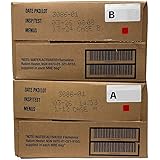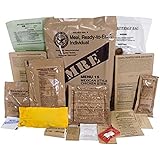How to Create a Financial Plan for Preppers
- Essential Components of a Financial Plan
- Budgeting for Preppers
- Investing Wisely as a Prepper
- Long-term Financial Security Strategies
Essential Components of a Financial Plan
Understanding Income and Expenses
As I started my prepping journey, one of the first things I realized was the importance of knowing exactly how much money was coming in versus going out. I’m talking about laying everything out on the table: bills, groceries, subscriptions, and any odd expenses that seem to creep in. This helps in figuring out a realistic picture of your financial situation.
Once I understood my cash flow, I was able to distinguish between needs and wants. This was crucial because in a prepper mindset, you want to prioritize essentials. For example, I decided to cut back on dining out and instead focus on stocking up on non-perishables.
Finally, keeping track of my income and expenses over time has allowed me to spot trends. If I noticed that I was spending too much on something non-essential, I could adjust my budget before it became a larger problem.
Setting Clear Financial Goals
Setting goals is one of the most important steps in creating a financial plan. By establishing short-term and long-term financial goals, I found it much easier to navigate my finances, and it gave me motivation to stay on track.
For the short term, I aimed for things like building an emergency fund and paying off a credit card. These goals felt attainable. In contrast, my long-term goals zoomed out; I wanted to save for a homestead or an off-the-grid cabin. Having these distinct timelines made the larger goals seem less daunting.
Additionally, it’s not just about saying, “I want to save money.” It’s critical to quantify these goals and attach specific dollar amounts to them. I set aside a certain sum every month for my emergency fund, which kept me focused.
== > What if ... Get a FREE Subscription to PREPARE
Creating a Contingency Fund
Every prepper knows that planning for the unexpected is essential, right? That’s where a contingency fund comes in. My personal motto is: expect the best but prepare for the worst! This means saving a little bit for those rainy days, like sudden medical expenses or property repairs.
Initially, I started small, aiming for just a few hundred dollars. But as I became more comfortable, I aimed to save around a month’s worth of expenses. Let me tell you – having that cushion provides a sense of security that’s priceless.
Lastly, I incorporated this fund into my overall budgeting plan. It didn’t feel like a loss when I treated my contingency fund as a necessary expense. Now, I can take on unexpected challenges with a lot more ease and confidence.
Budgeting for Preppers
Building Your Budget
Building a budget might sound boring, but trust me—it’s the backbone of your financial plan. I remember my first budget; I used spreadsheet software to create a visual representation of everything. It made all those numbers less intimidating.
I categorized my expenses into essentials, such as rent, food, and utilities, alongside non-essentials like entertainment. Seeing the breakdown helped me prioritize where I could cut back. You might be surprised at how much you can save by just making a few edits!
After tracking my expenses for a couple of months, I was able to adjust my budget based on actual spending versus estimated spending. This continuous cycle has made budgeting so much easier for me; now it’s like second nature.
Prioritizing Savings
Every prepper I know emphasizes the importance of saving for future goals. For me, I have a “pay myself first” philosophy, where every payday I automatically transfer a percentage of my earnings straight into savings. It’s like a forced savings plan!
I started by setting aside just 5% and gradually increased that number over time. The beauty of saving is that even small amounts add up. As my savings grew, I got excited about the possibilities it opened up for my prepping, like buying bulk food storage or emergency gear.
Another trick I’ve found helpful is using high-yield savings accounts, where the interest compounds more favorably. This means my savings can grow, even when I’m just sitting on it!
Regularly Reviewing Your Budget
My budgeting isn’t a one-time gig; I regularly review it—about once every season. This is important because my financial situation changes with new expenses and income variations.
I look for patterns and see where I can tighten my budget or adjust my goals. There’s no shame in tweaking your budget based on life’s changes! Plus, it keeps me informed about how close I am to my financial goals.
Regular reviews also help me celebrate little wins, like reaching a savings target or cutting enough expenses to buy that extra piece of gear I wanted. Each review reminds me that I’m moving forward, and that’s encouraging!
Investing Wisely as a Prepper
Understanding Different Investment Options
Once I had a strong budget and savings plan, it was time to dive into investments. Investing can really expand your financial security, especially in these unpredictable times.
I began by educating myself on the various options—stocks, bonds, real estate, and even precious metals like gold and silver. Right from the get-go, I found it crucial to align my investments with my prepping goals. For instance, I’ve started allocating some savings towards precious metals that can act as a hedge against inflation.
It’s essential to take the time to understand the risk involved with each investment type. Being educated means I can make informed choices and avoid panic selling during downturns.
Diversifying Investments
As a prepper, one big lesson I learned is: don’t put all your eggs in one basket! Diversifying my investments across different asset classes has proven to be a smart move.
For me, this means having a mix of stocks, bonds, and tangible assets. Each asset type reacts differently to economic changes, and spreading things out helps mitigate risks. When the housing market was shaky, my stocks held steady, and vice versa.
Over time, I’ve adjusted my investment strategy to reflect my preparedness goals, and that diversification allows me peace of mind regardless of what happens in the markets.
Long-Term Growth Investments
When I think like a prepper, I focus on long-term growth instead of quick returns. Sure, day trading looks tempting, but I prefer to invest in solid companies that show long-term potential.
This approach provides stability and allows me to ride out the inevitable ups and downs in the market. I also keep my eyes peeled for financial vehicles like retirement accounts that provide tax advantages for the long haul.
Plus, I regularly check in on my investments to ensure they’re still aligned with my long-term goals. It’s a bit like tending a garden; you want to nurture it, prune, and make adjustments as needed.
Long-term Financial Security Strategies
Creating Passive Income Streams
As I grew more comfortable with my financial plan, I started exploring ways to create passive income streams. This was a game changer for me! By investing in rental properties, I could generate income while I slept.
I’ve also explored dividend-paying stocks. They add additional income, and when dividends are reinvested, it compounds over time—it’s like a snowball effect! I still find it fascinating that I can earn money without actively working for it.
Having multiple income streams diversifies Financial security. In uncertain times, it reassured me to know that I wouldn’t solely depend on my 9-to-5 job.
Preparing for Emergencies with Insurance
Let’s face it—all preppers need to think about insurance. It acts like a safety net, making sure I’m covered for those unexpected hiccups that life throws my way.
I made sure to review my home, auto, and health insurance plans to ensure they provided adequate protection for what I hold dear. Certain policies, like umbrella insurance, were a surprise find and provided additional coverage beyond my standard policies.
This level of foresight helps shield my prepping investments. If something were to go wrong with one of my properties, for instance, I wouldn’t lose everything I worked for.
Staying Informed and Flexible
One of my core principles in long-term financial planning is to stay informed and flexible. The financial landscape can shift dramatically, so I regularly read articles, listen to podcasts, and participate in forums about prepping and finance.
I also remind myself that my goals aren’t set in stone. Life happens—job changes, family additions, unexpected expenses. Being willing to adjust my planning has been vital for me in keeping a cool head.
I’ve learned to view this journey as a marathon rather than a sprint. Financial security takes time, focus, and patience. Keeping my eyes on my long-term goals while being adaptable to unforeseen changes has made all the difference.
FAQs
What is the first step in creating a financial plan for preppers?
The first step is to understand your income and expenses. Laying everything out can help you get a clear picture of your financial situation, allowing you to prioritize your needs and wants accordingly.
How can I effectively budget as a prepper?
Start by detailing your essential and non-essential expenses, setting clear savings goals, and then reviewing your budget regularly. This way, you can make adjustments based on your life situations and celebrate your progress!
What types of investments are good for preppers?
Good investment options for preppers include stocks, bonds, real estate, and precious metals. Diversification across different asset classes is key for managing risk and ensuring long-term growth.
Why is insurance important for preppers?
Insurance acts as a safety net for unexpected emergencies, protecting your assets and investments. It’s crucial for maintaining financial security during challenging times, so it’s wise to review your coverage regularly.






